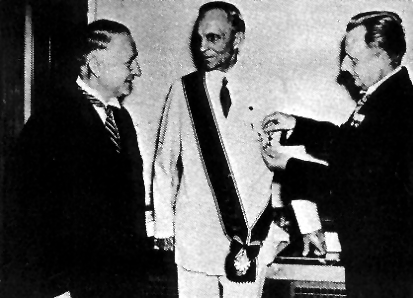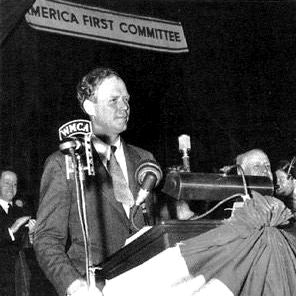Charles Coughlin
A Canadian-American Catholic priest and early-20th-century popular radio figure, “Father Coughlin” first took to the Detroit-area airwaves in 1926, broadcasting weekly sermons over the radio. By the early 1930s the content of his broadcasts had shifted from theology to economics and politics. Just as the rest of the nation was obsessed by economic and political matters in the midst of the Depression, so too was Father Coughlin. He predicated his finely developed theory of what he termed “social justice” on economic reforms. An early Roosevelt supporter who coined the famous expression “Roosevelt or ruin” he later turned against FDR and became one of the president’s harshest critics. His program of “social justice” was a radical challenge to capitalism and many of the political institutions of his day.
Coughlin’s early support for President Roosevelt was based on his image of FDR as a social reformer. Roosevelt’s rhetoric during his inaugural address promised to “drive the money changers from the temple”—music to Coughlin’s ears, since a core part of his own message was monetary reform. When FDR failed to follow-on with additional radical reforms, however, Coughlin turned against him. By 1936, he supported a third-party candidacy against FDR’s reelection bid.
Throughout the 1930s Coughlin used his popular weekly radio program—which averaged 3.5 million listeners every week—and his magazine, Social Justice, to spread his ideas and attack his enemies. From 1934 onward Coughlin’s targets included Roosevelt, individual Jewish leaders, and Jewish institutions—all branded as Communists.
Coughlin, a rightwing populist, advocated a form of corporatism influenced by Italian Fascism. In 1934 Coughlin organized the National Union for Social Justice through which he argued that neither capitalism nor democracy had a future in America. In 1938 the National Union developed into the Christian Front which was even more ardent in its support of fascism and became a mouth piece for Nazi propaganda. Subsequently, as war loomed in Europe, Coughlin supported isolationism, charging that Jewish financiers were secretly behind efforts to involve the U.S. in the war.
By the late 1930’s Father Coughlin’s broadcasts were increasingly anti-Semitic and politically controversial. Then, in the 1940s, the Vatican, American-Jewish leaders and the U.S. government pressured Coughlin to stop broadcasting and return to his parish. |



